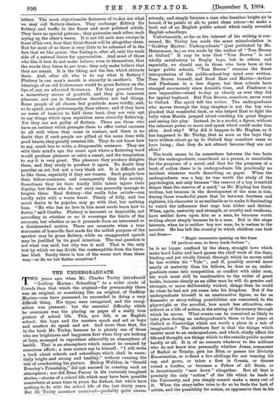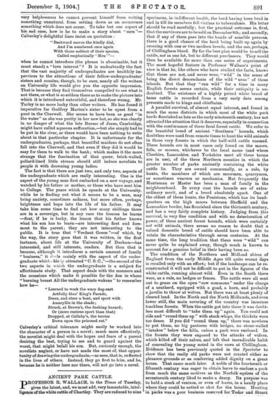T WO years ago, when Mr. Charles Turley introduced, "Godfrey Marten:
Schoolboy" to a wider circle of friends than that which the original—for presumably there, was an original, or something like an original, of Godfrey Marten—can have possessed, he succeeded in doing a very difficult thing. His types were recognised, and the recog- nition was pleasant ; but the essential difficulty which he overcame was the placing on paper of a really true picture of school life. This, you felt, is an English
• school; the boys and the masters speak and act as boys I and masters do speak and act. And more than that, for in the book Mr. Turley, because be is plainly one of those ; who see brightness and happiness first when they are looking ! at boys, managed to reproduce admirably an atmosphere of t health. That is an atmosphere which cannot be created by conscious effort ; a man cannot say to himself : "I will write 1 , a book about schools and schoolboys which shall be essen- tially bright and strong and healthy," without running the I risk of overdrawing his picture. Bishop Welldon, in "Gerald Eversley's Friendship," did not succeed in creating such an atmosphere ; nor did Dean Farrar in his curiously imagined stories,—stories of a school life which may have been possible I somewhere at some time in years far distant, but which have nothing to do with the school life of the last thirty years. But Mr Turley somehow contrived—probably quite uncon- sciously, and simply because a man who breathes bright air is bound, if he paints at all, to paint clean colour—to make a book out of an English public school which really revealed English schoolboys.
Unfortunately, so far as the interest of his writing is con- cerned, Mr. Turley has made the same miscalculation in "Godfrey Marten : Undergraduate" (just published by Mr. Heinemann, 5s.) as was made by the author of "Tom Brown at Oxford." It may be true that "Tom Brown" is not wholly satisfactory to Rugby boys, but to others, and especially, we should say, to those who have been at the larger public schools, "Tom Brown" remains the finest interpretation of the public-school-boy mind ever written. Tom Brown himself, and Scud East and Martin—Arthur and Flashman in a less degree, but then schools have changed enormously since Arnold's time, and Flashman is now impossible—stand to-day as clearly as ever they did for typical boyhood. But Tom Brown, somehow, never went to Oxford. The spirit left the writer. The undergraduate who moves through the long chapters is not the boy who plucked that wonderful duck, or who helped East to fight the bully when Martin jumped about cracking his great fingers and seeing fair play. Instead, he is a model, a figure, without the inherent power to move and speak which could make him alive. And why ? Why did it happen to Mr. Hughes, as it has happened to Mr. Turley, that as soon as the boys they have written about go up to Oxford they somehow cease to have being ; that they do not attract because they are not alive ?
The truth seems to lie somewhere between the two facts that the undergraduate, considered as a person, is unsuitable for the purposes of a novel, and that for the purposes of a book of action there is in undergraduate life practically no incident whatever worth describing on paper. When the undergraduate was a boy, he was worth the study of the psychologist, not only because "the reserve of a boy is tenfold deeper than the reserve of a maid," as Mr. Kipling has finely written, but because in the development of the man in him, during those wonderful years that lie between fourteen and eighteen, his character is so malleable as to make it fascinating to watch the influences that urge him hither and thither. When, again, maturity and strength, or cruelty and weakness, have settled down upon him as a man, he becomes worth writing about simply because he is a man. But in the stage between, when he is neither boy nor man, he is useless to the novelist. He has left the country in which children can look out from- " Magic casements opening on the foam Of perilous seas, in faery lands forlorn " ; he is no longer confined by the sharp, straight laws which make hard Latin and hard games the chief work of the days, binding and yet wholly liberal, through which he moves until he has written his " Vale "; and if, possibly arrived more nearly at maturity than his fellows, he does as an under- graduate come into competition or conflict with older men, his work must still be unattractive to the writer of great books, because clearly as an older man he will do greater and stronger, or more deliberately wicked, things than he could do when he had not yet come into his kingdom. But if the undergraduate himself is an unattractive figure, so far as dramatic or story-telling possibilities are concerned, to the playwright or the novelist, how much less attractive, con- sidered as a life of action, is the setting of the scenery through which he moves. What events can be conceived as likely to take place during an undergraduate's three or four years at Oxford or Cambridge which are worth a place in a tale of imagination ? The stubborn fact is that the things which matter most to an undergraduate, and which chiefly affect his life and thought, are things which to the outside public matter hardly at all. It is of no concern whatever to the millions who do not know him personally whether Jones, commoner of Balliol or Trinity, gets his Blue, or passes his Divinity Examination, or is fined a few shillings for not wearing his cap and gown, or takes a first in Greats, or dances round a bonfire, or becomes a Fellow of All Souls, or is incontinently "sent down" altogether. But all that is precisely the only "action" of the life which he leads at the University, and you simply cannot make a story out of it. When the story-teller tries to do so he finds the lack of action, and the possibility for action, so oppressive that in his very helplessness he cannot prevent himself from writing something unnatural, from setting down as an occurrence something which does not occur. To take but one aspect of his sad case, how is he to make a story about "men "— Calverley's delightful lines insist on quotation : "Backward moves the kindly dial, And I'm numbered once again With those noblest of their species, Called emphatically Men '"— when he cannot introduce (the phrase is abominable, but it must stand) a "love interest" ? It is undoubtedly the fact that the vast majority of undergraduates are healthily im- pervious to the attractions of their fellow-undergraduates' sisters and cousins, though, to be sure, nearly all the writers on University life would give you the opposite impression. That is because they find themselves compelled to see what is not there, or what is so seldom there as to make the picture into which it is introduced untruthful, and therefore wrong. Mr. Turley is no more lucky than other writers. He has found it imperative for Godfrey Marten's sister to be upset from a punt in the Cherwell. She seems to have been as good "in the water" as she was pretty in her new hat, so she was clearly, in no danger of what the late Bursar of Jesus, Cambridge, might have called aqueous suffocation,—but she simply had to be put in the river, or there would have been nothing to write about in that particular chapter. It is unfortunate for the undergraduates, perhaps, that beautiful maidens do not often fall into the Cherwell, and that even if they did it would be easy f3r them to walk to the bank; which makes it the more strange that the fascination of that queer, brick-walled, pollard-lined little stream should still induce novelists to people it with drowning young ladies.
The fact is that there are just two, and only two, aspects of the undergraduate which are really interesting. One is the aspect of the young man first embarked on a new voyage, and watched by his father or mother, or those who have sent him to College. The years which he spends at the University, while he is finding out what it means to be a man, may bring anxiety, sometimes sadness, but more often, perhaps, brightness and hope into the life of his father. It may take him some time to find out how many shillings there are in a sovereign, but in any case the lessons he learns —first, if he is lucky, the lesson that his father knows what his son has to learn—are interesting first and fore- most to the parent; they are not interesting to the public. It is true that "Verdant Green "—of which, by the way, the story goes that it was written, in the first instance, about life at the University of Durham—has interested, and still interests, readers. But then that is because, although it introduces a certain amount of family "business," it dr-sls mainly with the aspect of the under- graduate which hie ly attracted "C. S. C.,"—the second of the two aspects in which the undergraduate is a subject for affectionate study. That aspect deals with the manners and the occasions which make it possible for the don in whose "burning breast All the undergraduate wakens" to remember how he—
"Learned to work the wary dog-cart Artfully thro' King's Parade,
Dress, and steer a boat, and sport with
Amaryllis in the shade ; Struck, at Brown's, the dashing hazard ; Or (more curious sport than that) Dropped, at Callaby's, the terrier
Down upon the prisoned rat."
Calverley's critical tolerance might easily be worked into the character of a person in a novel ; much more effectively, the novelist might deal with the hopes and fears of a parent desiring the best, trying to see and to guard against the worst, that might befall his son. But, curiously enough, the novelists neglect, or have not made the most of, that oppor- tunity of drawing the undergraduate,—as seen, that is, reflected in the lives of others. Instead, they go first to him, and he, because he is neither here nor there, will not go into a novel.
ANCIENT PARS CATTLE.







































































 Previous page
Previous page